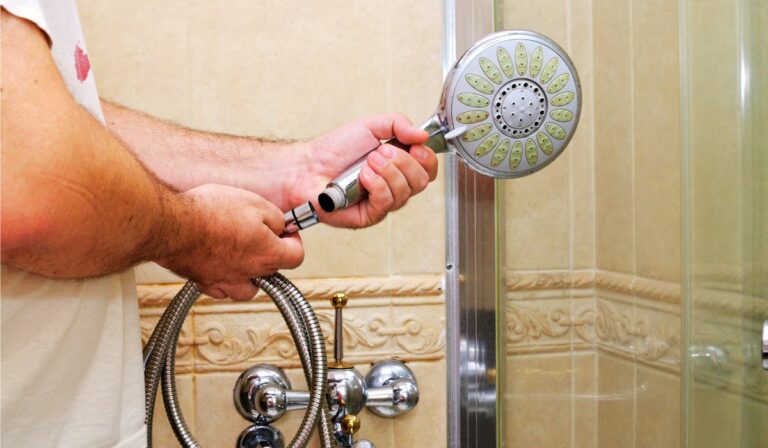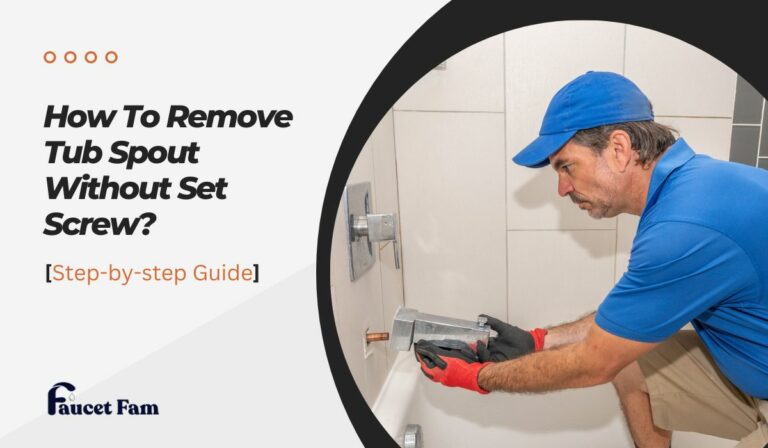Is a Squealing Shower Dangerous
If your shower squeals, it’s usually not dangerous right away, but it does mean there’s an issue like high water pressure, worn washers, or mineral buildup causing vibrations. Ignoring it can lead to leaks or water damage over time. You’ll want to check for loose parts or pressure problems and fix or replace worn components promptly. Keep exploring to find out how to identify the cause and when you should call a plumber to prevent bigger problems.
Common Causes of Shower Squealing
Although it might seem minor, shower squealing can quickly become a frustrating problem. You’ll often find that this noise stems from water pressure issues—when the pressure is too high, it creates vibrations that lead to that annoying squeal.
Another common cause is a worn or damaged washer inside the shower valve. These washers control water flow, and when they start to degrade, they can cause high-pitched sounds.
Sometimes, mineral buildup inside the faucet or showerhead restricts water flow, forcing water through tight spaces and creating noise.
Additionally, loose or faulty components, like a shaky valve stem or cartridge, can vibrate and squeal.
Potential Risks Associated With Shower Noises
When your shower starts making unusual noises, it’s not just an annoyance—it can signal underlying problems that put your plumbing at risk. You might face increased wear on valves and washers, leading to leaks or even water damage if ignored.
The squealing could indicate high water pressure, which stresses pipes and fixtures, potentially causing bursts or costly repairs. Over time, these noises might suggest mineral buildup or worn parts that reduce water flow and efficiency, raising your utility bills.
Ignoring these signs can escalate issues, turning a simple fix into a major plumbing headache. Paying attention to your shower’s sounds helps you catch problems early, saving you from unexpected expenses and preserving your home’s plumbing system.
Diagnosing the Source of the Squeal
How can you pinpoint the exact cause of that annoying squeal in your shower? Start by listening closely while the water runs. Try turning the faucet on and off slowly, noting when the noise appears. Check if the squeal changes with water pressure—higher pressure can trigger different sounds.
Next, inspect the showerhead and faucet for mineral buildup or loose parts, as these often cause vibrations. Don’t forget to examine the valves inside the faucet; worn washers or cartridges commonly produce squealing noises.
If you have access, listen near the pipes for any whistling or vibration. By systematically observing when and where the sound occurs, you can identify whether the issue lies in the fixtures, valves, or plumbing, setting the stage for an effective fix.
How to Fix a Squealing Shower
Once you’ve pinpointed the source of the squealing, you can start fixing it with targeted steps. First, turn off the water supply to your shower to avoid any leaks.
If the noise comes from the showerhead, remove it and check for mineral buildup. Soak the head in vinegar for an hour, then scrub away deposits with a brush.
For squealing valves, tighten or replace worn washers inside the cartridge. You might need to disassemble the valve carefully to access these parts.
If the noise comes from water pressure, adjust your home’s pressure regulator or install a pressure-reducing valve.
Finally, reassemble components and turn the water back on to test. These fixes often resolve squealing quickly without needing professional help.
When to Call a Professional Plumber
If you’ve tried the basic fixes and the squealing persists, it’s time to bring in a professional plumber. Persistent noise could signal underlying issues like worn-out valves, high water pressure, or pipe problems that require expert diagnosis and repair. Don’t ignore continuous squealing; it can lead to bigger damage or costly water waste.
Also, if you notice leaks, inconsistent water flow, or damage around your shower, call a plumber immediately. Attempting complex repairs without experience might worsen the problem or cause injury. A professional has the right tools and knowledge to safely fix the issue, ensuring your shower operates quietly and efficiently.
When in doubt, it’s better to get expert help than risk further damage or potential safety hazards.
Frequently Asked Questions
Can Shower Squealing Affect Water Pressure in Other Fixtures?
No, shower squealing usually won’t affect water pressure in other fixtures. It’s often caused by a worn valve or pipe vibration. You should still fix it to avoid potential damage or worsening noise over time.
Does Hard Water Contribute to Shower Squealing Sounds?
Yes, hard water can contribute to shower squealing sounds by causing mineral buildup in pipes and fixtures. You’ll notice increased friction and pressure changes that create those annoying noises during your shower. Regular cleaning helps!
Are Certain Showerhead Brands More Prone to Squealing?
Yes, some showerhead brands are more prone to squealing due to design or materials. You’ll want to research reviews and choose models with good flow control and quality components to minimize annoying noises in your shower.
Can Mineral Buildup Inside Pipes Cause Shower Noises?
Yes, mineral buildup inside pipes can cause shower noises like squealing. You’ll notice water flow gets restricted, creating pressure that makes pipes or showerheads whistle. Regular cleaning or descaling helps keep your shower quiet and smooth.
Is Shower Squealing Covered by Home Insurance Policies?
No, shower squealing usually isn’t covered by home insurance since it’s considered maintenance. You’ll want to fix the underlying issue yourself or hire a plumber to prevent bigger problems rather than relying on insurance for repairs.
Conclusion
If your shower is squealing, don’t ignore it. While it’s usually caused by common issues like water pressure or worn parts, the noise can signal something that needs fixing to avoid bigger problems. You can try simple fixes yourself, like cleaning or adjusting valves, but if the squeal persists, it’s best to call a professional plumber. Taking action early helps keep your shower working smoothly and prevents costly repairs down the road.


